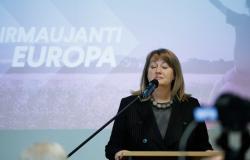“Operational capability, in terms of drone capability, must be achieved by the end of 2026, that is, by 2027. To carry out this work, the military should develop the drone capability in an integrated manner with other capabilities. This means that we do not see it as a separate unit, it interacts with our other available platforms – with our communication systems and in general with the tactical operation of our army”, said K. Budrys at the press conference after the VGT meeting.
Also, according to him, the aim is to have the drones used by the army produced in Lithuania.
“The President of the Republic worked on this during the last meeting with the defense industry companies, raising the question of what is possible to do in Lithuania, whether it is possible to raise the requirement “maximum production in Lithuania” when we are talking about drones of all levels. The answer from the industry was yes. Time is needed, interaction mechanisms are needed, and that is why the State Defense Council decided today to recommend the Ministry of National Defense to the Lithuanian army to develop drone capabilities with the capabilities of the Lithuanian manufacturing industry,” said the advisor to the country’s leader.
In order for the Lithuanian industry to contribute more to the production of defense equipment, legal acts also need to be changed, noted K. Budrys.
“There is a decision for the Government of the Republic of Lithuania to properly organize that legal environment in the near future,” he added.
According to K. Budris, the development of various drones in Lithuania will require about 30 million. euros annually.
“They also talked about finances, because the solution consists of several parts. This is one – how many drones we will need – both reconnaissance and combat, different sizes, classes according to the tasks we want to do <...>. By the way, not only aerial unmanned systems were discussed, but also marine unmanned systems, underwater drones, and their development. It was foreseen how much money was planned to be allocated. Those amounts are about 30 million per year. euros <...>. But here, probably, from the beginning, it was not a question of money, but a question of accepting new technologies, their assimilation,” said the advisor.
Laurynas Kasčiūnas, the chairman of the National Security and Defense Committee of the Seimas, candidate for the Minister of National Defense, who participated in the VGT meeting, said that Lithuania needs the entire ecosystem of drones, which would mean production, testing, innovation, and their use.
We cannot lag behind – we need to start both industry and training centers, said the MP.
“We have just started and are starting to create this ecosystem. Amendments to legal acts have been submitted, which will allow us to kindle the Lithuanian drone industry in a certain sense, so that state institutions can also buy Lithuanian drones, because of which we now had some obstacles”, L. Kasčiūnas taught.
“If you just buy some things and depend on global chains – that’s it, you’re isolated, you have serious problems. We have to do everything to prevent this from happening,” he emphasized.
Sees progress
Speaking in general about the development of drone capacity in Lithuania, the politician noted that he sees progress.
“I see a step forward, because from the focus on reconnaissance drones, to reconnaissance drones, we are finally moving to the development of combat drones – small FPV drones are becoming an integral, integral part of our armed forces,” commented L. Kasčiūnas and noted that in the army ” drop-in” and the process of preparing and training drone operators.
“We also have anti-drone solutions <...>. This is both the acquisition of certain weapons and certain innovative solutions for how our forces could destroy flying (enemy – Delphi) drones. A flying missile project is under development, that is, when a drone can destroy an incoming drone.
At the beginning of next year, we may already have good knowledge in this area. This is a project of our Lithuanian industry”, said L. Kasčiūnas.
In the event of a conflict, Lithuania as a border state, according to L. Kasčiūnas, would have to withstand the first blow of the aggressor, and drones are needed for that.
“The dominant doctrinal belief in the West is that if the Russians attack NATO, the war will be different than it is now in Ukraine. Some say drones are a tool for poor militaries. One can follow this doctrinal belief and hope that the enablers will come, the dominance of aviation will come, the deep strikes to the Russians will come, so that in principle the whole matter will be solved without drones.
But as a fringe country that may have to hold the first strike, we need to have that capability, regardless of these beliefs. [To reikia] to withstand the first blow. It programs the fact that we have to think about the development of attack, combat drones,” the chairman of NSGK taught.
At the beginning of the year, the development of unmanned aircraft systems in the Lithuanian army was discussed by the NSGK of the Seimas. The chairman of the committee, L. Kasčiūnas, assured that Lithuania already has the potential to expand combat FPV (English first-person view) drone production. Therefore, the committee headed by him prepared and submitted to the VGT the concept of strengthening the drone systems in the Lithuanian army.
As provided by the Constitution, VGT considers and coordinates the most important issues of state defense. The council includes the president, the prime minister, the speaker of the Seimas, the minister of national defense and the commander of the army. The Council is headed by the President.
He promises a decision on Kasčiūnas on Monday
At the press conference after the VGT meeting, K. Budrys also received questions on other topics – whether the president will appoint L. Kasčiūnas as the Minister of National Defense, and whether the president’s refusal to testify before the Seimas commission does not contradict the Constitution.
Regarding the first question, K. Budrys said that the head of the country, Gitanas Nausėda, would have made the decision on the appointment of L. Kasčiūnas earlier, if the Ministry of National Defense (KAM) had not been accused of corruption.
“Only after news of the minister’s resignation appeared, the president stated that he wanted to do it (appoint a new minister – ELTA) as soon as possible. Looking back, we can say that if it were not for the doubts about transparency in the Ministry of National Defense and other circumstances, the decisions would have already been made,” commented the advisor.
“The President of the Republic is interested in speed, efficiency, due to the fact that this area is extremely important and must be functional, not dysfunctional, with someone leaving and someone not coming, in terms of leadership,” he added.
The adviser emphasized once again that one or another decision of the president regarding the appointment of L. Kasčiūnas as the head of the Ministry of Foreign Affairs will be made on Monday, after the presidency receives more information from the Special Investigation Service (STT) regarding possible manifestations of corruption in the national defense system.
“Now we will only have to check whether STT has other information to know, whether their assessment changes, and then there will be an appropriate decision,” said G. Nausėda’s advisor.
“The president said that the decision will be made on Monday at the latest, so for now we are sticking to this schedule,” emphasized K. Budrys.
He did not testify before the Seimas commission: he claims that the lawyers assessed it
President G. Nausėda decided to ignore the questions put to him by the Seimas commission investigating the story of Tomas Gailius, the spokesperson of the Department of State Security (VSD). The chairman of the commission, Vytautas Bakas, stated that such a decision by the head of the country can be considered a violation of the law.
For his part, K. Budrys did not comment on the decision of the head of the country. He testified that the lawyers of the presidency assessed whether the Constitution was not violated by such a decision.
“I am convinced that the lawyers’ assessment was appropriate before submitting such an answer to the commission,” K. Budrys said.
“Last week, the position of the president was expressed – how he evaluates the commission’s final work and the writing of conclusions,” the adviser said.

The special commission of the VSD rapporteur, assembled by the Seimas, seeks to answer the questions whether during the 2019 presidential election campaign, the intelligence service legally collected information about the candidates, their environment, how they managed it and whether they passed such information to anyone.
The aim is also to find out whether SEB bank customer data was used in the recent campaign, and what electoral expenses the candidates incurred. Questions are also raised about the relations of the president G. Nausėdas, who won the elections, with representatives of the Belarusian fertilizer business. In addition, the commission wants to find out whether the law enforcement institutions – STT and the General Prosecutor’s Office – properly evaluated the information received after the whistleblower’s appeal.
The commission had to submit its conclusion and draft resolution to the Seimas by March 10, but with the start of the spring session, the work of the commission was extended until March 26.








